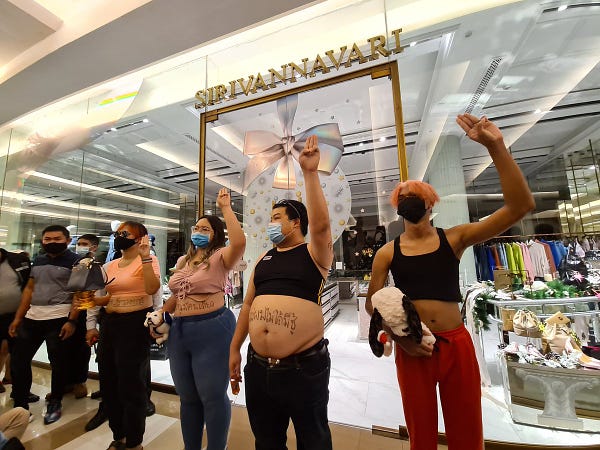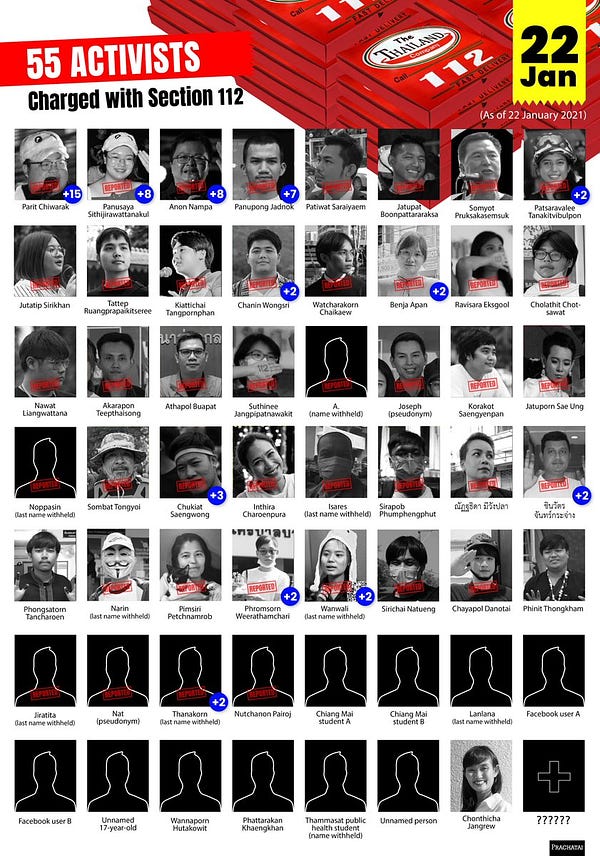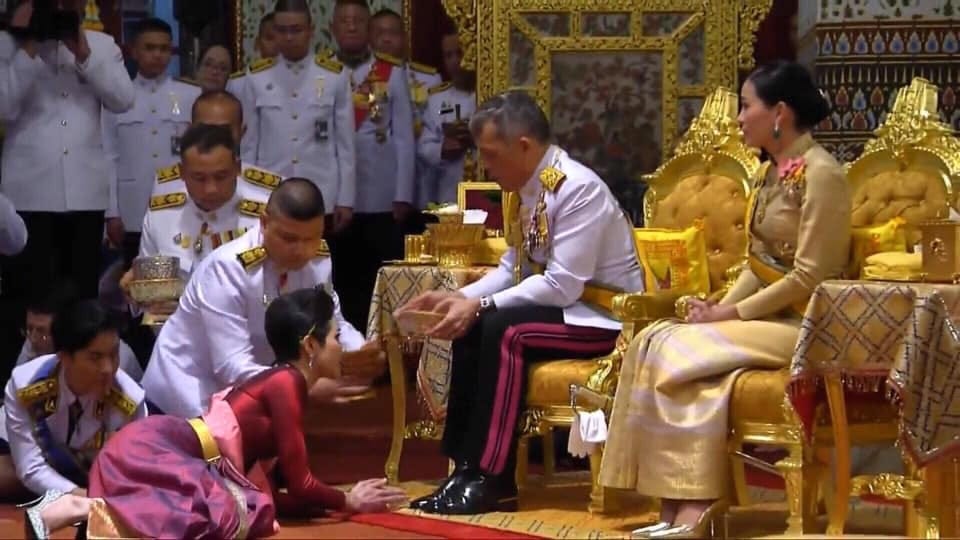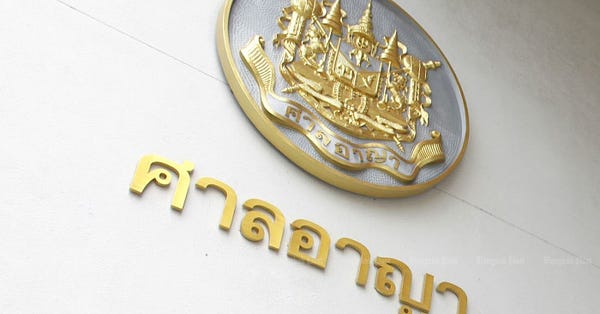After a tumultuous 2020, there is already plenty to report so far in 2021, so let’s get started…
A new chapter in the palace drama
Another dramatic twist is unfolding in the ongoing soap opera of King Vajiralongkorn’s turbulent personal life. According to multiple well-placed palace sources, the king is set to elevate his official consort Sineenat “Koi” Wongvajirapakdi to the status of queen, putting her on a similar level as Queen Suthida “Nui” Tidjai. Koi’s story is an amazing tale of an ordinary woman ascending to extraordinary heights as the consort of the king, suffering a sudden and shocking downfall when she was stripped of her royal titles and thrown in jail, and now, it seems, set to reach exalted status again after staging a remarkable comeback.
Niramon Ounprom, as Koi was formerly called, was born in 1985 in Nan province in Thailand. After graduating from the Royal Thai Army Nursing College in Bangkok in 2008 she worked as a nurse at Phra Mongkutklao Hospital and the Ananda Mahidol Hospital. By 2012 she had been recruited to royal service by Vajiralongkorn’s then-third wife Srirasmi Suwadee, and became part of Vajiralongkorn’s harem.
Since 2007, Vajiralongkorn had already mostly abandoned Srirasmi, and spent most of his time living in Germany with his favourite concubine Suthida after meeting her when she was a flight attendant on a Thai Airways charity flight which he piloted. Vajiralongkorn formally divorced Srirasmi in 2014, banishing her to house arrest in Ratchaburi and jailing most of her close relatives for lèse majesté. But while Suthida was his main partner for the next few years, Koi was steadily rising up the ranks of the harem. She appeared in one of the notorious leaked videos of Vajiralongkorn, when they strolled together through the Riem Arcaden mall in Munich on June 10, 2016, wearing revealing clothing and fake tattoos. They were also photographed in unusual attire at the Segmüller furniture store in Pasdorf on April 25, 2017.
By the time Vajiralongkorn married Suthida in May 2019, in a ceremony just before his official coronation designed to give a degree of respectability to his private life, the couple were already living mostly separate lives. Suthida lived most of the time at the Hotel Waldegg in the Swiss resort of Engelberg, while Vajiralongkorn was based at the Grand Hotel Sonnenbichl in the Bavarian resort of Garmish-Partenkirchen with a harem of about 20 women. Koi was his favourite member of the harem.
In an extraordinary ceremony on Vajiralongkorn’s birthday on July 28, 2019, just three months after he had married Suthida, the king elevated Koi to the special aristocratic rank เจ้าคุณ, or Noble Royal Consort. She was only the second woman to receive this rank since the Rama V era. Thais were agog at images of the ceremony showing a prostrating Koi being anointed as consort as Queen Suthida watched.
Koi aggressively began promoting her image and eclipsing Suthida. She took on several major royal duties and was central to the creation of the Volunteer Spirit civilian royalist organisation, as well as the annual winter fair in which Thais dressed as 19th-century aristocrats to celebrate the past era of royal absolutism. The palace even issued a 46-page official biography of her in August 2019 with 60 photographs showing her posing with Vajiralongkorn, piloting a plane and preparing for a parachute jump. So many Thais tried to log on to view the document that it crashed the palace website.
Inevitably all this caused vicious infighting in the palace, with factions supporting Suthida bitterly opposed to Koi’s ascent. Royal sources say Vajiralongkorn’s eldest daughter Princess Bajrakitiyabha and her allies also clashed with Koi. The conflict came to a head in October 2019, during one of Vajiralongkorn’s extended stays in Thailand to prepare for the Royal Barge Procession. A palace statement accused Koi of being disrespectful and overly ambitious: “Royal Noble Consort Sineenat is ungrateful and behaves in ways unbecoming of her title. She is also not content with the title bestowed upon her, doing everything to rise to the level of the queen.” She was stripped of all royal titles and thrown into jail at the Central Women’s Correctional Institution at Lat Yao, without any trial or legal due process. Just three months after becoming the king’s “Noble Consort”, Koi had come crashing back to earth and been purged from the palace.
Fast forward to August last year, when royal sources began reporting that Vajiralongkorn was planning to forgive Koi and resume their relationship. This development reignited the factional warfare raging in the palace, and during August letters were mailed to me and to Pavin Chachavalpongpun in Japan, containing an SD card with 1,443 images extracted from three iPhones that Koi had used between 2012 and 2014. Most of the images were selfies and several were extremely explicit. While the source remains unknown, it is highly probable that the images were sent by a faction opposed to Koi and trying to sabotage her return. I made the decision not to publish any of the photographs, while Pavin has published several but has not shared the most explicit ones. The strange episode illustrated the extent of the conflict raging in the palace.
Sure enough, 10 months after jailing her, the king decided to reunite with Koi. She was released from prison and flown back to Munich on August 29 in one of the king’s personal Boeing 737s to rejoin his harem at Grand Hotel Sonnenbichl. Photographs taken by a journalist at Munich Airport showed Vajiralongkorn went to greet her personally as she arrived — wearing one of the crop tops that have become an infamous part of his wardrobe.
The rehabilitation of Koi has caused intense embarrassment for the monarchy during Vajiralongkorn’s latest extended trip to Thailand, which began in October. Both Suthida and Koi have frequently attended the same royal ceremonies, generating awkward images of the two of them ignoring each other at palace events. The drama spawned rival camps on social media, with Suthida and Koi each having competing Instagram fan clubs. Over time, Koi has been seen more and more with Vajiralongkorn, with Suthida becoming ever less visible. Koi is clearly winning the factional battle for supremacy. Senior palace advisors and members of the extended royal family are in despair at the damage this is doing to the monarchy at a time when Vajiralongkorn’s image is already plumbing new depths.
Now, Thailand’s aristocracy has been thrown into fresh uproar after Vajiralongkorn decided he wants to promote Koi to the rank of queen. This news has been circulating for several weeks in royal circles, and it provoked intense opposition among leading members of branches of the extended Chakri dynasty such as the Yugala and Rangsit clans. Vajiralongkorn’s sister Princess Sirindhorn was also deeply unhappy about the news, because if Koi is elevated her own status in the royal hierarchy will move down another notch. Although Sirindhorn and senior aristocrats in the other branches of the royal family mostly gave up trying to influence the king long ago, and avoid disagreeing with him for their own safety, they felt so strongly about his latest plan that Sirindhorn went to see her brother to try to change his mind. This led to the most explosive development in the whole saga.
Two weeks ago, the palace announced that Sirindhorn had injured both of her ankles in a fall, and had been taken to hospital. As usual with royal health bulletins, it greatly understated the seriousness of her injuries, and of course it also failed to explain what had actually happened. According to well-placed sources, a furious row erupted during Sirindhorn’s meeting with her brother. She was knocked over by one of Vajiralongkorn’s dogs, and while she was lying on the ground he either stamped on her ankles or struck them with a cane, shattering both of them.
Thailand is always awash with lurid gossip about what goes on behind closed doors in the palace — some of it true, much of it just baseless rumour. As a journalist specialising in reporting Thai royal issues, it’s my job to figure out the truth from fiction. I was initially sceptical about rumours that Vajiralongkorn had violently attacked his sister, and it’s worth noting that Somsak Jeamteerasakul, who also has some very good palace sources, remains unconvinced that this incident took place. But from my own investigations, I believe that the story is indeed true. It’s widely circulating in informed palace networks. Sirindhorn underwent operations on both ankles at Chulalongkorn Hospital and is unlikely to walk again for months.
An announcement on Koi’s promotion to Thailand’s second queen was initially planned for January 26, her 36th birthday, but it has not happened yet, perhaps because of what happened to Sirindhorn as well as the opposition of senior royal figures. There is also some uncertainty over what rank of queen she will be given — Thailand’s monarchy is so hierarchical that there are actually several gradations of queen, dating from the days when kings used to have several of them. But it remains highly likely that before long, Thailand will have two official queens for the first time since the reign of King Vajiravudh, Rama VI, who died in 1925. It is another step in Vajiralongkorn’s efforts to turn back the clock to the era of absolute monarchy when the king could do whatever he pleased and have numerous wives and concubines.
An official marriage to Koi could further complicate the possibility of him ever returning to live in Germany. The controversy over his extended stay in Bavaria has already caused embarrassment and awkwardness for both the Thai and German governments. Polygamy is outlawed in Germany, and it is unclear how Berlin would react to the presence of a foreign monarch who not only frequently exercises Thai sovereignty from Bavaria, but also has two official wives.
Grave doubts also hang over Suthida’s position. Given the grim treatment of his three previous wives after he grew bored of them, she must inevitably be fearful about her future.
Lèse majesté is back — and crazier than ever
Among the most ominous recent developments in the Thai regime’s efforts to stifle the protest movement that shook the kingdom last year is the return of aggressive enforcement of the lèse majesté law after a three-year hiatus.
For decades, the Thai regime and monarchy used this outdated and draconian law to silence dissent and prevent Thais from learning the truth about the country’s history and politics. Not only did it chill freedom of speech within Thailand, it also intimidated the international media into avoiding reporting the real facts about the monarchy and the antics of the royals. This was the main reason I decided to exile myself from Thailand and begin deliberately breaking the law a decade ago, and it’s also why I have launched this newsletter.
In 2017, soon after officially starting his duties as King Rama X, Vajiralongkorn held a series of meetings with Sulak Sivaraksa, a maverick Buddhist scholar who is among Thailand’s most respected elder statesmen. Sulak is one of the few prominent Thais who have been consistently unafraid of speaking their mind and calling for reform of the monarchy, and has himself faced several lèse majesté cases in the past, at times having to go into exile. In their meetings, Sulak convinced Vajiralongkorn that far from protecting the reputation of the palace, zealous enforcement of Article 112 actually damaged the image of the royals. Vajiralongkorn ordered police and judges to stop enforcing the law. This exposed the falsity of the myth that King Bhumibol himself had been opposed to the law but powerless to do anything about it. Vajiralongkorn suspended the use of the law by just commanding people to stop, although this was not made public at the time.
The cessation of pursuing lèse majesté cases made little practical difference to freedom of speech in Thailand, because the regime regards any criticism of the monarchy as an attack on national security, and used the equally draconian Computer Crimes Act to continue suppressing discussion of the royal family. If anything, the Computer Crimes Act made freedom of expression in Thailand even worse. But at least the end of lèse majesté prosecutions was a step in the right direction.
But as I documented in my review of Thailand in 2020 here and here, perhaps the most extraordinary development of the year was the explosion of open questioning, mockery and defiance of the monarchy — first on social media, then on the streets. This level of mass public criticism is unprecedented in Thai history. It has enraged Vajiralongkorn and infuriated royalist Thais who believe unquestioning devotion to the monarchy is an inviolable cornerstone of Thai identity. The king ordered the government and judiciary to resume use of the lèse majesté law, a development signalled last November when Prime Minister Prayuth Chan-ocha declared that from now on, the regime would use “use all laws, all articles, to take action against protesters”. Soon lèse majesté charges were filed against 12 of the main protest leaders, including Anon Nampha, Panusaya "Rung" Sithijirawattanakul, Parit “Penguin” Chiwarak, Patsaravalee “Mind” Tanakitvibulpon, Panupong “Mike” Jadnok, Piyarat “Toto” Chongthep, and Tatthep “Ford” Ruangprapaikitseri. Meanwhile, two other protest leaders, Ekachai Hongkangwan and Paothong “Francis” Bunkueanum, had already been charged under an even more extreme law that potentially carries the death penalty, over absurd allegations that they had threatened the safety of the queen.
Unusually for lèse majesté cases, all the accused eventually received bail, suggesting the regime remains wary of cracking down so heavily that it provokes another escalation of mass protests. Protesters held a rally on December 10 to denounce Article 112, and after news emerged that a 16-year-old had also been charged with lèse majesté for wearing a crop top in a light-hearted fashion show poking fun at the monarchy, several activists including Penguin and Rung paraded to the Sirivannavari store at Siam Paragon wearing crops tops to mock the absurdity of the law.


Events so far in January show the regime is now escalating its offensive against the protest movement with increasingly harsh enforcement of the law. Not only is it using Article 112 against protesters, it has also resumed processing old cases that had been put on hold back in 2017. The first inkling of this was an announcement on January 13 that a man had been acquitted over sarcastic comments about King Bhumibol’s favourite dog. Although the verdict was welcome, the fact that courts were once again issuing rulings on lèse majesté cases was an alarming sign.
Then on January 18, Sirapop Kornaroot, a poet and activist who uses the pseudonym Rung Sila, was sentenced to four-and-a-half years in jail for lèse majesté and computer crimes. He’d been arrested in June 2014 while trying to flee into exile following the coup, and was detained for five years awaiting trial until receiving bail in 2019 when his case was moved from a military tribunal to a civilian court. Because he had already served more time in detention than his eventual sentence, he is not required to go back to jail.
The most shocking verdict so far came on January 19 when 65-year-old former civil servant Anchan Preelert was sentenced to 87 years in prison — cut in half to 43 because she pleaded guilty — for sharing 29 audio clips on social media featuring Hassadin Uraipraiwan, a critic of the monarchy known as “Uncle Banpodj”. The absurd verdict was the longest ever sentence for lèse majesté and sparked worldwide condemnation. Unless she receives a royal pardon, she will die in jail just for sharing material online that she had no involvement in producing.
In an excellent article, veteran Thai journalist Pravit Rojanaphruk noted the reaction to the verdict: “Draconian, disproportionate, anachronistic, outrageous, barbaric, unjust..” BBC correspondent Jonathan Head tweeted that the sentence “sums up the madness of lese majeste”.
Head also correctly noted the reason for the bizarrely excessive verdict, observing: “Hard not to see this terrible sentence as a warning to those questioning the monarchy”.
This is the method the regime has always used to try to silence criticism of the monarchy and terrify Thais into keeping quiet. Rather than prosecute every single person accused of insulting the royals, a few unfortunate victims are singled out and given shockingly punitive sentences to send a message to the rest of the population. A leaked US cable from 2009 described the strategy using a Thai proverb: “Kill the chicken to warn the monkey.”
On January 20, the regime announced another extraordinary lèse majesté charge. Thanathorn Juangroongruangkit, the progressive billionaire who founded the Future Forward Party which captured the imagination of Thai youth and scored a remarkable result in the 2019 general election, gaining more than six million votes and winning 80 seats to become the third largest political bloc in parliament, was charged under Article 112 for publicly questioning a deal in which Siam Bioscience, a company owned by the king, will produce coronavirus vaccines in Thailand for AstraZeneca.
Vajiralongkorn has long seen Thanathorn as a nemesis, and pressured the Constitutional Court into banning him as an MP in November 2019 and dissolving the Future Forward Party in February 2020. By charging him with lèse majesté, the regime has dramatically escalated its war on Thailand’s democracy movement.
At the latest count, according to a tally by news agency Prachatai, at least 55 people are now facing lèse majesté charges.

This is an unprecedented number of cases, and signals the palace will use Article 112 relentlessly this year in a desperate effort to neutralise pressure to reform the monarchy.
Questions about Thailand’s vaccine go viral
The decision to file lèse majesté charges against Thanathorn has inflamed the debate in Thailand about the transparency of the deal between Siam Bioscience and British pharma giant AstraZeneca for production of a coronavirus vaccine in Thailand. The deal was announced last October by the British government, which stated: “Large scale manufacturing at Siam Bioscience will strengthen broad, equitable and timely access to the potential vaccine in Southeast Asia and beyond.” This immediately raised questions, because Siam Bioscience is not a widely known company and there are doubts over its ability to deliver “large scale manufacturing”. The mystery deepened when Permanent Secretary for Public Health Kiattiphum Wongrajit declared Siam Bioscience was the only company in Thailand with the technological capacity to produce the vaccine. Moreover, the cost of making each dose in Thailand appeared to be considerably higher than elsewhere. Thais wanted to know how the contract had been agreed upon, and what the terms of the deal were.
The main reason for the controversy is that Siam Bioscience is owned by Vajiralongkorn himself — it’s part of the vast trove of assets worth at least $70 billion that was previously administered by the Crown Property Bureau until the king took direct personal ownership of all royal wealth in June 2018. The pro-democracy protests of 2020 focused attention on Vajiralongkorn’s opaque web of companies and property, and on whether the monarch is personally profiting from assets that should belong to the state rather than the palace.
The issue is particularly sensitive because the royals have frequently been caught out pretending to donate equipment to combat coronavirus for propaganda purposes. Last year Princess Sirivannavari launched a hand sanitizer with the branding of her eponymous fashion label, a move widely derided as a PR stunt, especially because she shared photographs of herself dressed as a doctor with her favourite pet dog wearing a nurse’s hat.
On January 19, 21-year-old Thammasat University student Benja Apan held a protest outside the $1.7 billion luxury IconSiam mall — another royal asset via the Siam Piwat holding company — holding a sign that read: “Vaccine Monopoly is PR for the Royals”. She was assaulted by a security guard.
The following day, Thanathorn was charged, but has refused to back down. “Prayut has always used the royal institution to hide the inefficiency of his administration, saying that he is loyal to the monarchy and protecting it,” he told a news conference. “Is this not why many people are raising issues with the monarchy institution?”
Siam Bioscience has now issued a statement in response to the furore. The company says it was founded in 2009 and produces two major products — erythropoietin to treat patients with chronic renal failure, and filgrastim for cancer patients receiving chemotherapy. It claims to have “world-class quality standards in place, alongside consistent operational excellence”. The company also stated it would make no profit from the vaccine: “To support the global fight against the pandemic and in line with AstraZeneca’s own commitment, Siam Bioscience is manufacturing the vaccine under a ‘no profit, no loss’ framework for the duration of the pandemic.”
Intriguingly, the statement was attributed to Nualphan Lamsam, who says she is “Honorary Director of Corporate Communications of Siam Bioscience”. Nualphan, who calls herself “Madam Pang”, is one of Thailand’s crazy rich Asians, an heiress of the Lamsam family which founded Kasikorn Bank. Her main official job is CEO of Muang Thai Insurance. She is also a well-known socialite and close friend of Sirivannavari, frequently pictured kneeling at the feet of the princess. Her involvement in Siam Bioscience is unlikely to dispel accusations that a royalist cartel is profiting from the coronavirus in Thailand.
Over the weekend, a light projection protest was held at the Siam Bioscience headquarters, and this morning activists gathered there to demand transparency.

It’s clear that unless the Thai regime responds openly to questions about the vaccine, rather than seeking to prosecute dissent, the issue is not going to go away.
Further reading and viewing
Finally, for anybody who hasn’t seen it yet, the recent BBC report on Thailand’s democracy movement by Jonathan Head and team is well worth watching. Because they are based in Thailand, they inevitably have to be careful in what they say about the king, but it’s an excellent piece of journalism. You can only view it on YouTube, and it’s age-restricted so you’ll have to sign in to see it. The link is here.
Another thing well worth your time is this excellent introduction to the Thai protests by US academic Tyrell Haberkorn. It includes a detailed discussion of some classic books and articles on Thailand. Highly recommended.
That’s all for Secret Siam today. I hope you have found in useful.
The next edition on Friday will analyse what’s in store for 2021.
Have a great week!





Inga kommentarer:
Skicka en kommentar